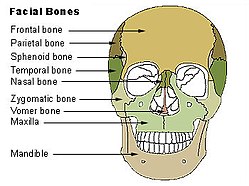Vomerine teeth
| Vomer | |
|---|---|

Vomer labeled at left.
|
|

Bones and cartilages of septum of nose. Right side. (Vomer visible at bottom left.)
|
|
| Details | |
| Identifiers | |
| Latin | Vomer |
| MeSH | A02.165.407.600 |
| TA | A02.1.11.001 |
| FMA | 9710 |
|
Anatomical terms of bone
[]
|
|
The vomer (/ˈvoʊmər/) is one of the unpaired facial bones of the skull. It is located in the midsagittal line, and articulates with the sphenoid, the ethmoid, the left and right palatine bones, and the left and right maxillary bones. The vomer forms the inferior part of the nasal septum, with the superior part formed by the perpendicular plate of the ethmoid bone. The name is derived from the Latin word for a ploughshare and the shape of the bone.
The vomer is situated in the median plane, but its anterior portion is frequently bent to one side.
It is thin, somewhat quadrilateral in shape, and forms the hinder and lower part of the nasal septum; it has two surfaces and four borders.
The surfaces are marked by small furrows for blood vessels, and on each is the nasopalatine groove, which runs obliquely downward and forward, and lodges the nasopalatine nerve and vessels.
The superior border, the thickest, presents a deep furrow, bounded on either side by a horizontal projecting expansion of bone – called the wing of vomer; the furrow receives the rostrum of the sphenoid, while the margins of the alae articulate with the vaginal processes of the medial pterygoid plates of the sphenoid behind, and with the sphenoidal processes of the palatine bones in front.
The inferior border articulates with the crest formed by the maxillæ and palatine bones.
The anterior border is the longest and slopes downward and forward. Its upper half is fused with the perpendicular plate of the ethmoid; its lower half is grooved for the inferior margin of the septal cartilage of the nose.
...
Wikipedia
